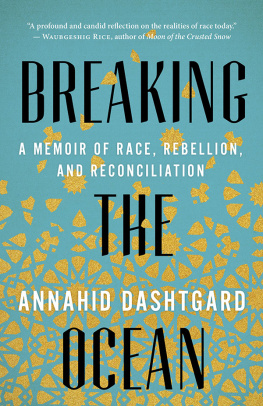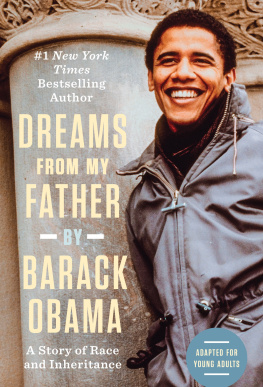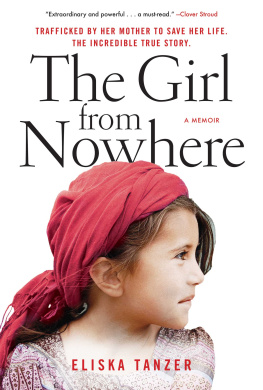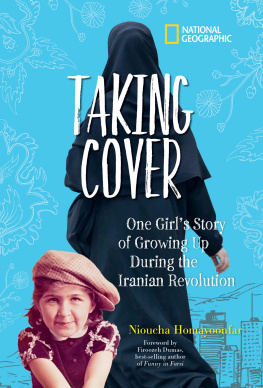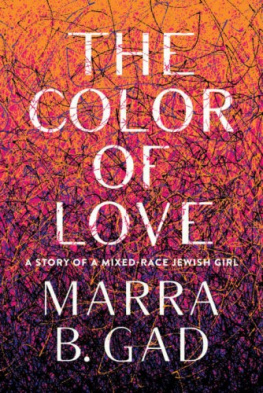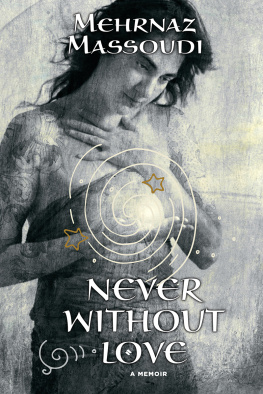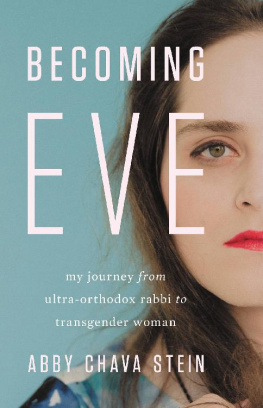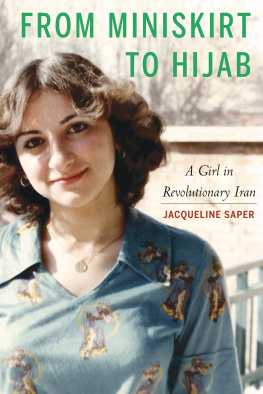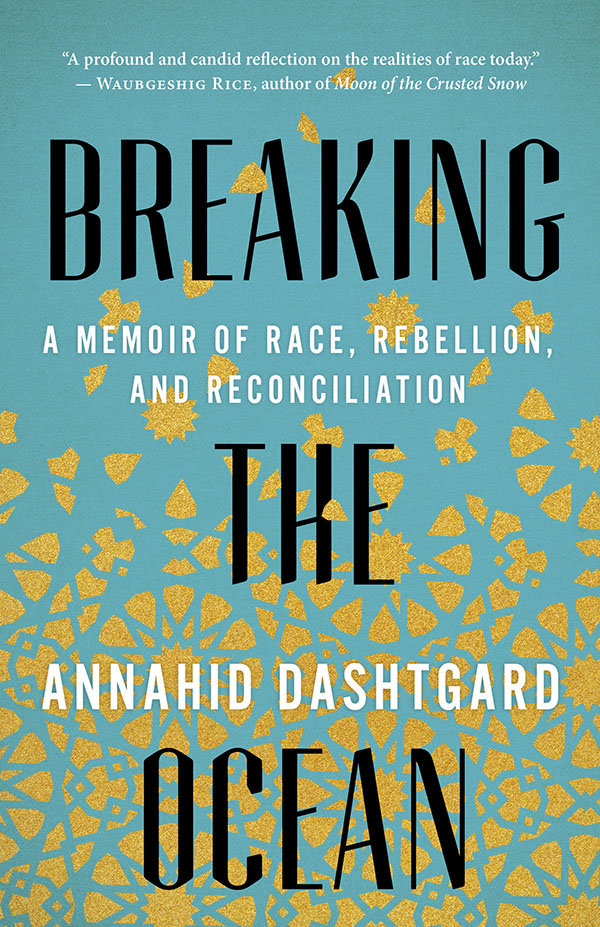Copyright 2019 Annahid Dashtgard
Published in Canada in 2019 and the USA in 2019 by House of Anansi Press Inc.
www.houseofanansi.com
All rights reserved. No part of this publication may be reproduced or transmitted in any form or by any means, electronic or mechanical, including photocopying, recording, or any information storage and retrieval system, without permission in writing from the publisher.
Library and Archives Canada Cataloguing in Publication
Title: Breaking the ocean : race, rebellion, and reconciliation / Annahid Dashtgard.
Names: Dashtgard, Annahid, author.
Identifiers: Canadiana (print) 20189067047 | Canadiana (ebook) 20189067055 | ISBN 9781487006471 (softcover) | ISBN 9781487006488 (EPUB) | ISBN 9781487006495 (Kindle)
Subjects: LCSH: Dashtgard, Annahid. | CSH: Iranian
CanadiansBiography. | Iranian CanadiansSocial conditions. | LCSH: Political refugeesIranBiography. | LCSH: Political refugeesCanadaBiography. | LCSH: Political activistsCanadaBiography. | LCGFT: Autobiographies.
Classification: LCC FC106.I5 Z7 2019 | DDC 971/.00491550092dc23
Library of Congress Control Number: 2019930410
Book design: Alysia Shewchuk

We acknowledge for their financial support of our publishing program the Canada Council for the Arts, the Ontario Arts Council, and the Government of Canada.
For my family.
And for anyone who has ever struggled to belong.
Contents
Authors Note
Names of family members and close friends have been kept; all the rest have been changed to obscure the identity of the person or organization mentioned. In some cases, the person mentioned is an amalgam, created to serve narrative purposes. As most lives are touched by countless others, I had to sort through to find the key characters necessary for this particular story. Had I written on a different theme, others may have appeared, or the same, but to varying degrees. Lastly, it is not my intent to cast any blame, embellish, or manipulate, but to tell this story as plainly as it is in my power to do. I leave you to the journey.
Prologue
It is the beginning of September, the first day of school, and the sun is flirting with making an appearance. Butterflies fill my stomach, but in a good way. Today marks my four-year-old daughters first day of attending the big school at the end of our street. Shes wearing the robins-egg-blue dress I bought for her birthday earlier this year with the silver filigree design down the front an echo of her Middle Eastern roots. My husband Shakil and I leave the house to drop her off together. With her marching gait, laser-beam gaze, and set mouth, she seems fine. Better off than her mama.
I feel alone. The paralyzing isolation I felt during the early years of motherhood has given way to tenuous new connections with many other parents through daycare, local Facebook groups, and community gatherings but Im still off balance. Despite reaching middle age, despite having achieved professional success, despite all the wonderful things and people in my life, this moment undoes me.
The sight of monkey bars and green playing field makes me feel tight and floaty at the same time. I know its because a part of me was left behind in a place just like this, where I learned that in order to survive I had to make myself disappear. I cant catch my breath. I feel dislocated.
My daughter runs into the play area without a backward glance, and I call her back to give her one last hug. Enjoy your first day at your new school, Baba. I love you so much, I whisper. I cant tell if its her or some earlier version of myself that I watch twist and spin away, the past collapsing into the present. All I know is that my daughters story begins with my story. And my story begins with my people.
Part I
Race
you broke the ocean in
half to be here.
only to meet nothing that wants you.
Nayyirah Waheed, immigrant
One
Persian Girl
Ive always loved fairy tales, yet I never saw myself in one, never pictured myself as a princess. Sleeping Beauty, Rapunzel, and Cinderella seemed so far away, so fantastical, until I started to write my own story. As I embarked on this journey, I realized how many frogs Id had to kiss in my lifetime, how many spells Id had to break, how many monsters lying in wait had been slain and how many monsters were still lurking in the shadows. I found red dancing shoes, and a pea under many mattresses. I stumbled upon a recipe for fairy dust. And I discovered that even if Im not a princess I can still make my own happy ending or at least a version of one, because this journey doesnt end. Like all fairy tales, though, it does start with...
Once upon a time, at the turn of the twentieth century, a boy named Abdullah escaped from his nomadic community to the big city of Shiraz in Iran in search of a better future. He was just twelve, a member of one of the northern Indigenous tribes, the Ghashghaei. As in many other countries, this itinerant population represented the poorest, least-educated segment of Iranian society. When Abdullah was asked his last name for a potential job, he made one up on the spot (tribal culture had no use for surnames). Dashtgard, he said, coining a phrase meaning wanderer of the desert. He lost any further contact with his family and tribe.
Abdullah was my fathers father. He fell in love with the first car he ever saw, a Rolls-Royce, and got a job chauffeuring rich people around Shiraz. He would jump at any job that came his way, and so it was that some years later he was driving a bus, taking a family to a picnic in nearby Persepolis, when he momentarily lost control of the vehicle. But it wasnt his fault. Hed looked in the overhead mirror and caught a glimpse of my Mamanbozourg (grandmother), Talat, sitting in the second row. Later, during the picnic, he approached Talats mother to ask if he could visit the next day. That was the beginning of their and my story. My grandmother was from a working-class family her father was a bread maker and they were devout Muslims. Abdullah and Talat were married soon after they met, he at eighteen and she at thirteen. Early in their marriage they moved to the capital so he could drive a bigger, better car for another rich family. Tehran became their home.
In another country, on another continent, there was a second man, an Englishman and a Methodist lay preacher, who was born around the same time as his nomadic peer. This was Allan Exton, my mothers father. When Britain entered the Second World War, my maternal grandfathers religious convictions concerning non-violence led him to register as a conscientious objector, and his refusal to bear arms in military service made him a social pariah. Conscientious objectors were required to serve in other ways, often doing farmwork for little to no remuneration, and this enforced servitude continued at least ten years past the end of the war.
Allan had met my grandmother, Elsie, just before the war. She came from a working-class family where it was often a struggle to put nourishing food on the table, never mind pay for grammar school necessities. My grandmother was the lone scholarship student who travelled daily from her small town of Irthlingborough to the nearby larger town of Kettering. She entered teaching college at age twenty-nine, and married my grandfather a year later. After the war, she gave up her profession to settle with my grandfather on a plot of land they bought in a small village called Skellingthorpe, making ends meet with a small market garden.

